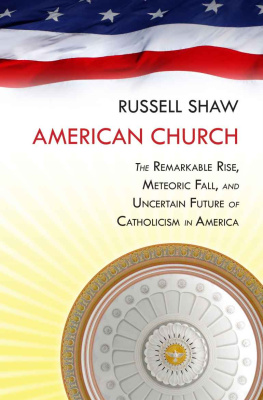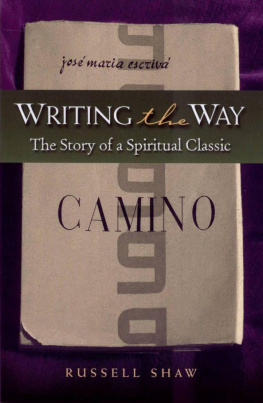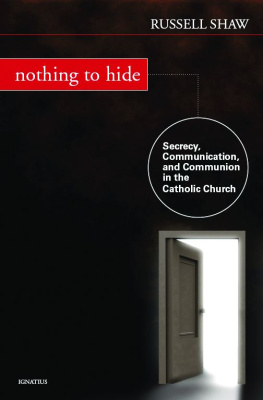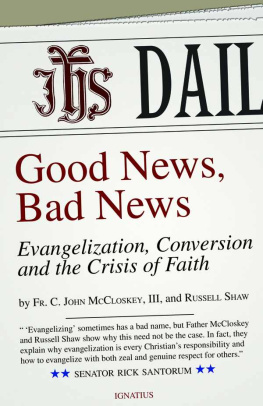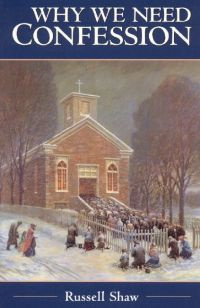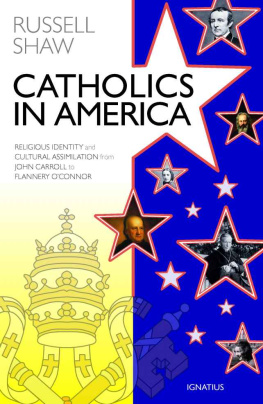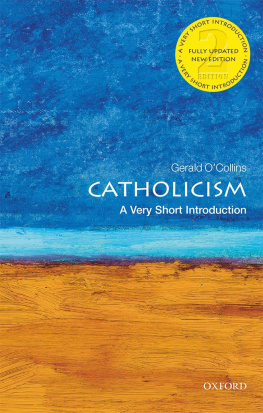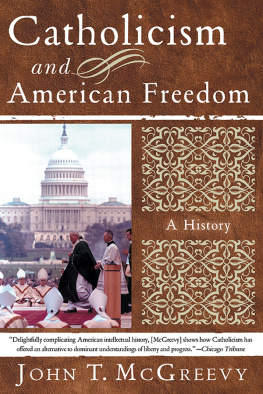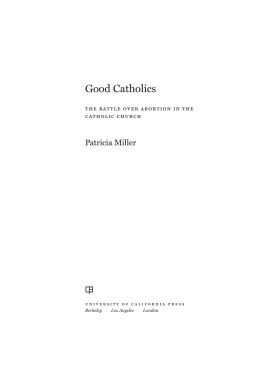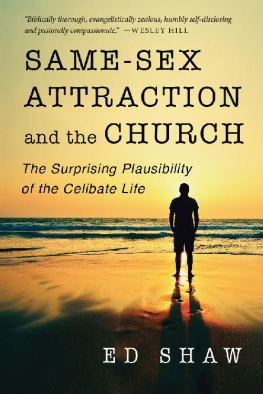AMERICAN CHURCH
RUSSELL SHAW
AMERICAN CHURCH
The Remarkable Rise, Meteoric Fall,
and Uncertain Future of
Catholicism in America
Foreword by
Archbishop Charles J. Chaput, O. F. M. Cap.
IGNATIUS PRESS SAN FRANCISCO
Unless otherwise noted, Scripture quotations (except those within citations) have been taken from the Revised Standard Version of the Holy Bible, Catholic Edition. The Revised Standard Version of the Holy Bible: the Old Testament, 1952; the Apocrypha, 1957; the New Testament, 1946; the Catholic Edition of the Old Testament, incorporating the Apocrypha, 1966; the Catholic Edition of the New Testament, 1965, by the Division of Christian Education of the National Council of the Churches of Christ in the United States of America. All rights reserved.
Cover Image: The oculus of the dome of the Basilica of the National Shrine of the Assumption in Baltimore Maryland. The Basilica was designed by Benjamin Henry Latrobe between 1806 and 1821. Latrobe was Americas first professionally trained architect and Thomas Jeffersons architect of the US Capitol.
Cover design by Milo Persic
2013 by Ignatius Press, San Francisco
All rights reserved
ISBN 978-1-58617-757-7
Library of Congress Control Number 2012942824
Printed in the United States of America
CONTENTS
FOREWORD:
YOU SHALL BE MY WITNESSES
Theres a passage in Acts that Ive reread and reflected on ever since I was a young priest: And you shall be my witnesses in Jerusalem and in all Judea and Samaria and to the end of the earth (Acts 1:8). I go back to that verse again and again, because it reminds me that the believing community that began in Jerusalems Upper Room now preaches Jesus Christ around the world. And that always renews my hope. In the wake of ten difficult years for the Church in the United States at the start of the twenty-first centuryin fact, as Russell Shaw so eloquently details in these pages, its been a difficult half centurywe need to remember that over the centuries, God has always called men and women to renew and extend his Church. Today that same vocation belongs equally to every faithful Catholic.
The apostles who preached the gospel on the first Pentecost had several things in common. Each had been called by Jesus. Each had known him firsthand. Each had denied, failed, and abandoned him. Each had repented. Each had been forgiven. And each, despite his sins, had received the same commission: Go therefore and make disciples of all nations (Mt 28:19). Jesus knewin advancethe sins of every man he chose. And still he chose them, and still he sent them out to convert the world in his name.
Therein lies the mystery of every Christian life. God sanctifies the world with sinful clay. The clergy misconduct scandal of the early 2000s is a tragedy in every sense. But it is not unique. From the Old Testament to the present day, the story of Gods priests and Gods people has been one of sin, chastisement, repentance, conversion, and renewal.
The problems we face today as believers really arent so different from the ones weve faced in the past. God calls us to spread the light of Christ despite the shadow of our own sins. This is the paradox of all discipleship. Its Gods school of humility. Were not worthy to be disciples, but God calls us to that work anyway. In bearing our sins with humility, our weakness becomes the antidote to our pride, and this enables us better to serve Gods will. Scripture teaches us that when Israel had worldly success, she failed. So it is too with the Church. What we need to learn from our failures as a people of faith is our own inadequacy without God.
There may have been a time when a genuinely Catholic life could be comfortable or placid. But if it ever really existed, that time is over.
The men and women God calls today, and the people the Church needs today, must be heroes. Striving for heroism needs to be part of our daily lives. We need to be people who love God more than ourselves; who seek Gods glory more than our own; who want to lead by serving others; who have a mercy and a humility born of a knowledge of our own sins; who have the courage to preach the truth even in the face of contempt; and who have a hunger for winning souls. We need to be people who are faithful to the Church and her teachings and who witness the joy of Jesus Christ to others.
The world we live in is not a friend of the gospel, no matter how superficially religious American culture may still sometimes seem. It has contempt for Jesus Christ, contempt for the Cross, and contempt for the people who carry their own cross and follow him. In the years ahead, the kind of people we need are believers who will turn away from comfort, who will listen for the voice of God, who will follow Jesus Christ into the storm and, in their failures, turn to him as Peter did: So Peter got out of the boat and walked on the water and came to Jesus; but when he saw the wind, he was afraid, and beginning to sink he cried out, Lord, save me. Jesus immediately reached out his hand and caught him, saying to him, O man of little faith, why did you doubt? (Mt 14:29-31). This is the kind of faith that changed the world from Jerusalem to all the ends of the earth. And its really the only kind of faith that can change the world of today.
To put it another way, we teach other people with the example of our lives. If we believe, others will more readily believe. If we are holy, others will more easily hear their own call to holiness. The crisis in todays Church is finally a crisis not of resources but of baptism; it is a crisis of faith. The central issue of modern American Catholic life is the temptation to accommodate, to compromise, to get along, and to fit inand then feel good about it. We accept tepidness in the name of pluralism. We put diversity of belief and behavior above truth. We place the individual above the common good. We elevate tolerance above love, justice, and real charity. None of this converts anybody. It does the opposite. It provides people with alibis for indifference and inaction, and it leeches away their faith.
Its important for us as disciples to fully understand the culture of our timefrom the economic pressures dividing families, to the power of the mass media, to the appeals of consumer comfort, to the persuasiveness of science and technologywithout being captured by it ourselves. We cant give to others what we dont have ourselves. If our own faith and zeal and desire for souls are weak, we cant expect anything different from the people around us.
What people really believe, they act on. And when they dont act, they dont really believe. For all of us as American Catholics, this issue of faith is the heart of the matter. Real faith changes us. It hammers us into a new and different shape. We too often confuse faith with theology or ethics or pious practice or compassionate feelings, all of which are importantvitally important. But real faith forces us to face the deeply unsettling command given to each of us in the First Letter of Peter: As he who called you is holy, be holy yourselves in all your conduct (1:15).
Holiness means being in the world but not of it. It means being different from and other than the ways of our time and place, and being conformed to the ways of God, as Isaiah says: For my thoughts are not your thoughts, neither are your ways my ways, says the Lord. For as the heavens are higher than the earth, so are my ways higher than your ways, and my thoughts than your thoughts (Is 55:8, 9).
To the degree Catholics have longed to join the mainstream of American life, to become like everyone else, to accommodate and grow comfortable and assimilate, rather than be other than and holy, weve abandoned who we really are. Clergy and religious face this temptation just as vividly as laypersons. Like the Jews in the days of Jeremiah, too many American Catholics have too often forgotten the covenant. Weve burned incense to other gods, and worshiped the works of [our] own hands (Jer 1:16). Weve ignored the final command Christ gave to all of us when he said, Go therefore and make disciples of all nations. He was speaking to each of us, right here and right now. Catholics are a missionary people led and served by a missionary priesthood.
Next page
